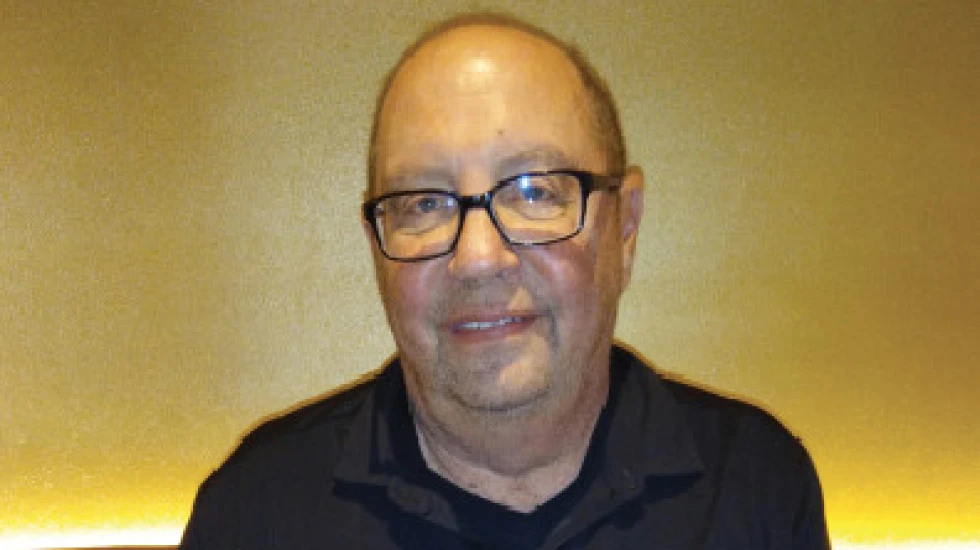
LAS VEGAS — Losing to Syracuse deflated Pitt quarterback Niko Peramos, who had dreamt of national-championship glory his senior season. Instead, the Panthers would play Illinois in the Alamo Bowl.
Niko got invited to the Heisman Trophy festivities in New York, and some believed he’d go No. 1 in the NFL Draft with millions awaiting him in professional football.
His persistent whining about that defeat to the Orange, though, irritated his brother Stavros.
“Adelphós mou, listen . . . do you think maybe you’re being a little hard on yourself? Quit beating yourself up.”
Enter the despicable Hairdo, who wants Niko to fix the Alamo Bowl, and Big George, the Peramos patriarch with underworld ties, and the debut novel of Chris Andrews blasts off.
Its title, “Adelphós Mou,” (My Brother), is a nod to his rich Greek heritage.
Andrews, the South Point’s 66-year-old sportsbook director, has penned two popular nonfiction books about his lively career setting sports odds and taking wagers.
The novel, which will be published next month, is raw and savage, incorporating metaphor, symbolism and surprise. He began writing it after an enlightening maiden voyage to Crete in 1998.
An Andrews friend reviewed “Adelphós” and told him, “You write with such emotion.” “That’s what I’m looking for,” he says, “to make you feel something.”
It digs into his roots in Pittsburgh and Greece, with visits to Iceland, London and Las Vegas. Andrews has toyed with its visual possibilities.
Too much depth for a movie, he concludes. Can’t be told in two hours. Four or five, maybe six episodes. “Maybe a Netflix mini-series.”
HITTING A NERVE
The framed lithograph, five feet wide and three feet high, dominates the living room of his Las Vegas home and says everything about Andrews.
Anthony Quinn’s arms are wide, Greek fisherman’s cap in left hand, daffodil in right, head askew. He’s moments away, maybe, from breaking into a Sirtaki, his fabulous dance that concludes “Zorba the Greek.”
“Triumph” is a self-portrait by Quinn, the creative genius and native of Chihuahua, Mexico, who played Zorba in Michael Cacoyannis’ 1964 production filmed entirely on Crete.
Nikos Kazantzakis’ novel “Zorba the Greek,” published in 1946 as “Life and Times of Alexis Zorbas,” highlights a peasant showing uptight writer Basil how to celebrate life unabashedly.
He made clear for Basil, wrote Kazantzakis, “the meaning of art, love, beauty, purity, passion.”
Andrews says every Greek considers the late Quinn — a perfect Big George, he daydreams — an honorary countryman.
“In ‘Guns of Navarone,’ Quinn played a Greek, too,” says Andrews, who has visited his native land four times. Those journeys provided “Adelphós” with invaluable depth and context.
“[They] helped a lot, in understanding the culture, and a lot of little things are in there. I definitely hit a nerve with how they are, especially Manoli, the Greek banker. I think I nailed him pretty good.”
He nailed all of it. Anyone who doesn’t thirst for a raki — the half-shots of pomace brandy that Cretans often sip but rarely get drunk on — upon finishing the tome doesn’t have a heartbeat.
Daughter Jacque has been a vital manuscript editor/proofreader. Andrews requested an uncompromising appraisal from an author-friend, who suggested making it leaner and meaner.
Andrews trimmed its 160,000 words to 120,000, employing grittier lingo. Other specialists vetted it. A lawyer pal told Andrews, ‘‘Yeah, that’s the way jurisprudence would work.’’
He emailed a courtesy manuscript to me last fall. The unflinching dialogue drips with authenticity. Known these people all my life, says Andrews, in Pittsburgh’s many-cultured nooks and valleys.
“I think it’s real and reflects the tone of the characters. On an emotional level, my heart and soul is in this book. I can still read it and get tears in my eyes in certain parts”
NOBODY’S PERFECT
Andrews and I are fond of many gritty black-and-white movies of the 1950s, give or take a decade, that air on TCM. I’d text him when Zorba was just starting.
“Already on,” he’d write back.
If his final days are near, wife Pam knows to have a TV, tuned to TCM, at his bedside.
He first watched ‘‘Zorba,’’ the movie, when he was 17 and first read the book at 30 or 31. Near Heraklion on Crete, the largest of approximately 300 Greek isles, the international airport is named after Kazantzakis, who died in 1957 at 74.
Among Andrews’ four packed bookcases, Kazantzakis titles dominate the special shelf, including “Zorba,” “The Last Temptation of Christ,” “The Odyssey: A Modern Sequel,” “Captain Michalis” and “Saint Francis.”
The one prized by Greeks, he says, is “Freedom and Death,” about the Cretan battle for independence from the Turks 100 years ago.
Odysseus, who hatched the Trojan Horse idea, is another hero.
“Flawed, really flawed,” Andrews said. “The perfect Greek. A warrior. A brilliant [bleeping] con man. Not a guy you would ever trust. That’s our people. In Zorba, Basil finally says, ‘I’m tired of saying, Is this a good guy or a bad guy?’
“Well, everybody’s got both in them. That’s Zorba. And nobody in my book comes out of it seen as perfect. Nobody.”
Andrews has long felt like a Renaissance man, keen to cook and travel. He isn’t just a guy, he says, “making numbers and taking bets.” He has at least one more nonfiction project and another piece of fiction on his agenda.
His first stab at a novel?
Triumph.







